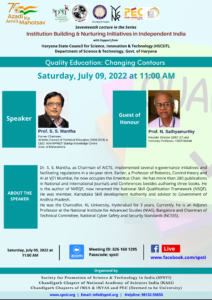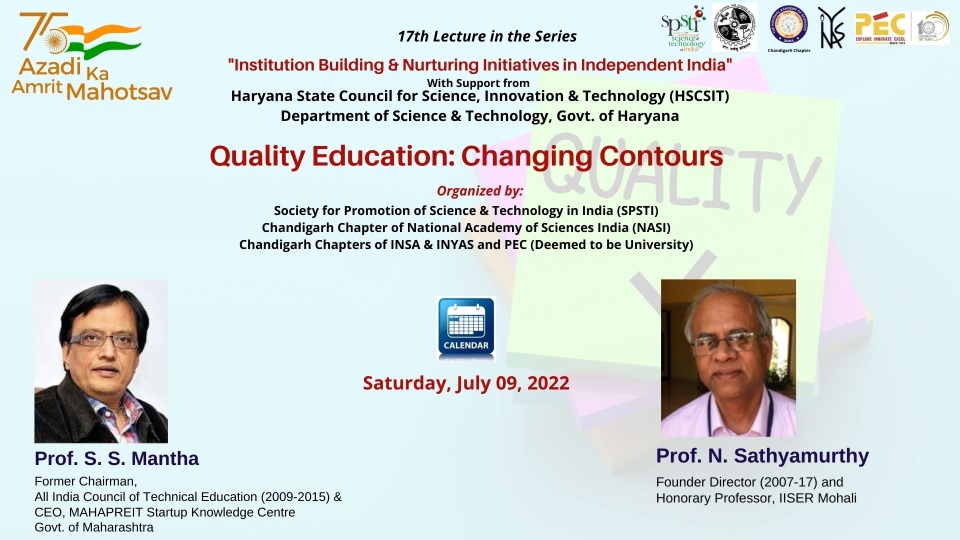Ancient Education was more focused on Self-Reliance – Prof. Mantha
The Society for Promotion of Science & Technology in India (SPSTI) in its one of the popular lecture series – ‘Institution Building & Nurturing Initiatives in Independent India’, organized the 17th lecture on Quality Education in India on Saturday. Prof. S.S. Mantha, Former Chairman of AICTE, Govt. of India was the invited speaker and Prof. N. Sathyamurthy, Founder Director of IISER Mohali was the Guest of Honour. Prof. Mantha took the audience to the ancient period’s education system which involved Vedic in Sanskrit and Buddhist in Pali and were majorly focused on imparting ethics like humility, truthfulness, discipline, self-reliance and respect for all creations. He apprised about the foundation of universities laid in the very first millennium – Nalanda, Takshila, Ujjain & Vikramshila universities. Taking to the modern education, he mentioned the contribution of Lord Macaulay, who introduced English language in 1830s. Later, the era of science, technology & innovation in 21st century catalyzed the learning through online platforms. He shared that inspite of having more than 1000 universities and 45,000 colleges in India, the Gross Enrolment Ration is only 26 whereas GER is about 98 and above 70 in case of primary and secondary education. It reveals a higher drop-out rate in higher education system, some of the reasons being the lack of quality education due to inadequate faculty members, poor faculty quality, shrinking job opportunities, etc. He also discussed some National frameworks like NIRF developed to assess quality of the higher education institutes in terms of education and research.
While talking about the factors that affect quality, he shared that teaching, learning, research, IPRs, Patents, infrastructure, connect with industry & society, collaborations, internationalization, governance are the important ones. Prof. Mantha also raised the concern of increasing diversity in the nature of universities and lacking inclusiveness of all specializations under one roof, which could otherwise complement inter-disciplinary research like the early universities that nurtured all facets of education like humanities, liberal arts, social sciences, basic sciences and applied sciences. Talking on quality research, he quoted that India has only140 researchers per ten lakh population as compared to 4651 in US.
He stressed the need of next generation labs in partnership with industry and international universities to align the education system with the industrial and societal needs. Demonstrating interest graphics, he mapped the skills required to synchronize with Industry 4.0, some of which included Machine Learning, Big Data, Python, Cloud Computing, Mathematical Finance, Agile Management, Project Planning, Analytics etc. Concluding his talk, Prof. Mantha emphasized the need of blended mode of learning with appropriate portions of physical and online learning modes.
There was a healthy question answer session held at the end of the talk. Prof. Arun K. Grover, former Vice Chancellor of Panjab University, Prof. Harish Kumar of UIET, Prof. Keya Dharamvir, General Secretary of SPSTI, Shri Dharam Vir, IAS (Retd.) & President SPSTI, Prof. Arvind, VC of Punjab University, were present in the session.


